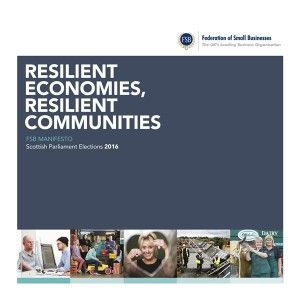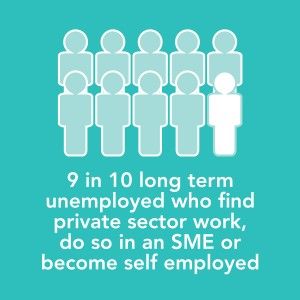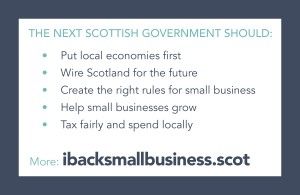Small businesses in Scotland are commonly referred to as the lifeblood of the economy for good reason. They employ 1m people, account for 98% of the nation’s private enterprises, and are represented by the Federation of Small Businesses in Scotland, which has around 19,000 members. In this article, Susan Love highlights some of the key messages from their 2016 manifesto.
Scotland has displayed extraordinary resilience: recovering, adapting, innovating through decade-after-decade of change, challenge and crunch.

The FSB’s Scottish manifesto was launched earlier this month
In our recent past, industrial decline followed IT boom and bust, followed by financial crash and now the oil and gas downturn. In the most part, the country has recovered and economically recalibrated.
Indeed, headline economic statistics suggest that Scotland has made up some ground since the height of the most recent economic downturn. But these figures tell us nothing about the reality of doing business in Kelso, the job prospects in Kyle of Lochalsh, or the high street in Kilmarnock.
A Deeper Understanding
It would be fair to suggest that while there may have been national recovery, many localities still bear the scars of past crises. Members of the SURF network probably don’t need this point underlined.
 Scotland must develop new ways to turn failing places around and ensure that local economies aren’t perilously dependent on a small number of mobile large employers or industries. This point extends to communities reliant on state-led industries and public sector employers, now straining because of pressure on the national purse.
Scotland must develop new ways to turn failing places around and ensure that local economies aren’t perilously dependent on a small number of mobile large employers or industries. This point extends to communities reliant on state-led industries and public sector employers, now straining because of pressure on the national purse.
The Federation of Small Businesses’ 2016 Scottish Parliament manifesto – dubbed Resilient Economies, Resilient Communities – pleads with policy-makers to look beyond national indicators, and develop new metrics to measure the health of our local economies.
We need to measure the resilience of our communities – because only then can we identify local strengths and weaknesses. The evidence base available through the ‘Understanding Scottish Places’ tool should be expanded to include more economic indicators, such as business start-up rates, thus creating reliable and comparable data on the economic performance of towns.
Practical Government Action

Small businesses provide opportunities to the long-term unemployed
Local decision-making and budgeting should be devolved to town-level, allowing outdated infrastructure to be addressed. In addition, too many Scottish public bodies have closed offices and buildings on high streets and in towns, while others plough on with edge-of-town developments. Financial penalties must be applied for agencies and departments who choose to make myopic short-term savings at the expense of the long-term viability of a local area.
While inward-investment and key sectors remain important to Scotland, more needs to be done to support small firms and the communities in which they’re based. Our business development approach focuses support on a few high-growth firms. We’d make the case that this puts many of our eggs into a single basket.
The next Scottish Government must appoint a Cabinet Secretary for Business, whose job will be to advocate for the enterprise community and consider the impact on localities of every government decision.
Their first job could be knocking heads together in public bodies until they make public contracts easier to access for the very smallest firms. If just 1 in 10 Scottish public procurement pounds by 2021 was spent with firms with fewer than 10 employees, that would mean an extra £250m for these businesses every single year. To state the obvious, smaller businesses are much more likely to be based in Scottish conurbations than their transnational counterparts.
We need to build communities that are more resilient to global economic shocks – and that means spreading our risk by broadening and strengthening our small businesses. Improving our digital infrastructure is a key ask – ensuring no business or area is left in the digital slow lane, while neighbours speed off into the future.

Similarly, improving how Scottish business interacts with the state online could give all Scottish firms a boost. We believe that we can boost compliance, reduce the regulatory burden and stop lining the pockets of lawyers (sorry lawyer members!) by developing user-friendly systems.
Scotland’s economic future lies in learning the lessons of the past – only by spreading our risk and leaving no community behind can we develop national and local strength and depth.
Visit ibacksmallbusiness.scot for more on the FSB in Scotland’s 2016 manifesto.

